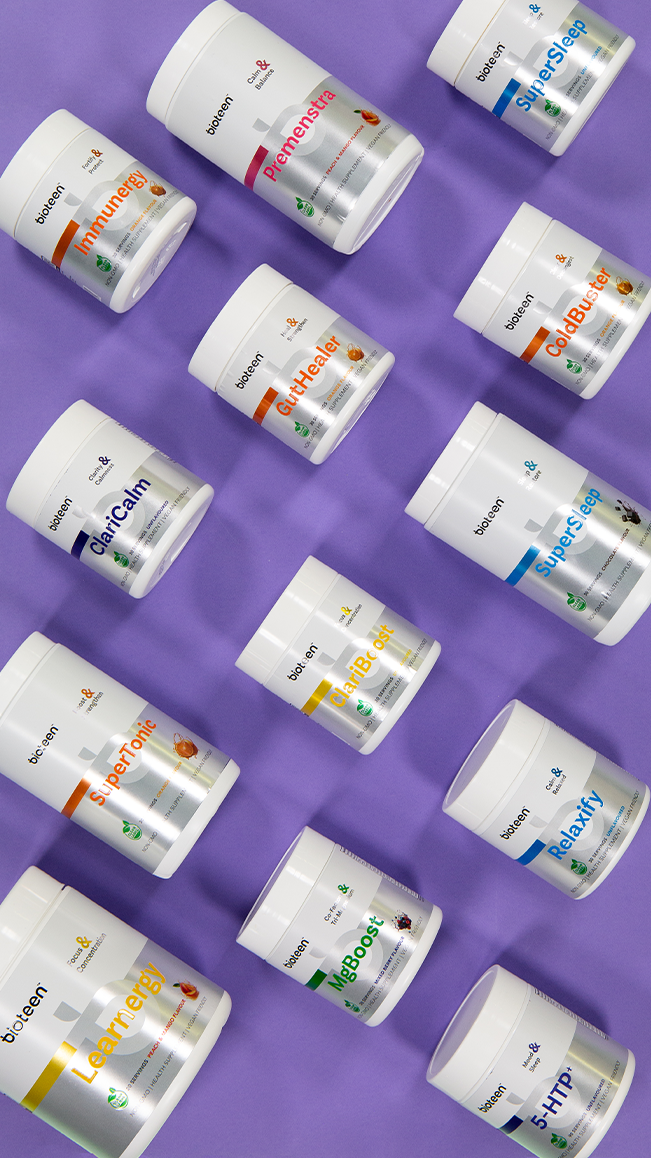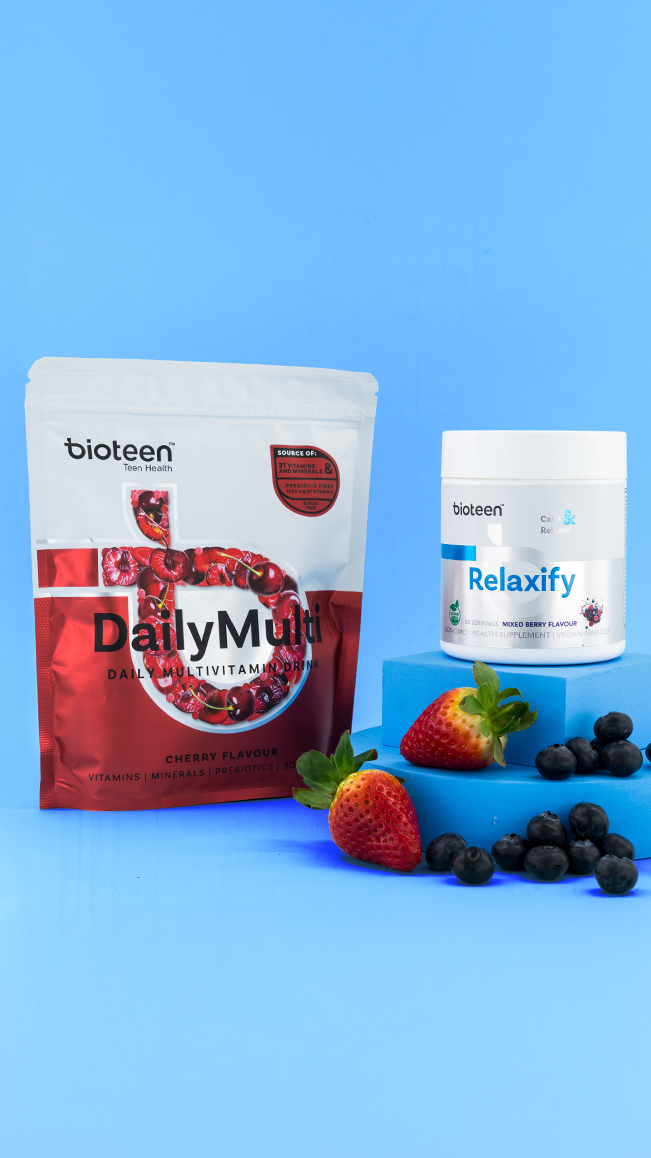
The importance of Feminine Health
As if being a teen wasn’t challenging enough, the hormonal changes associated with the menstrual cycle can be a particular pain, both physically and emotionally. These changes are all part and parcel of puberty, but this doesn’t make them any easier to deal with.
One of the most common hormonal side effects that menstruating teen’s can expect is PMS or premenstrual syndrome. While researchers aren’t 100% sure what causes PMS symptoms (1), they think that hormonal changes are most likely to blame, and the real kicker is that it affects some more than others.
Learn more about our unique PMS supplement here
Let’s explore what they can expect:
Hunger and cravings
Feeling hungrier than usual and craving sweet and salty foods are commonly associated with hormonal changes (including PMS). In general, it appears that these effects are greater in those that experience Premenstrual Dysphoric Disorder (PMDD) (2), which is a more severe form of PMS but ask any person who menstruates, and they’ll tell you that it’s universal.
One of the proposed reasons why this may be so prevalent is because menstruation may affect blood sugar levels (3), causing them to dip below their norm. While this dip can’t technically be classified as ‘low blood sugar or hypoglycemia (because in a healthy person, blood sugar levels are tightly controlled by insulin and glucagon) it can still be low enough relative to normal to cause some unpleasant symptoms. To make matters worse, teen’s may be uniquely sensitive to blood sugar dips because their brains use up more glucose than adults (around 30% more) (4,5).
Read more about blood sugar management here
The problem with increased hunger and cravings is that it throws teen’s off track when it comes to choosing healthy, more balanced options. And once they start eating foods that are high in concentrated carbs and sugars, the blood sugar roller coaster starts, and it is difficult to get off. In addition to lower blood sugar levels, the serotonin system may also be affected during PMS which can also magnify carbohydrate cravings (2,6). Together, they may cause teen’s to make poor food choices which can lead to unwanted weight gain and also possible nutrient deficiencies (if low-nutrient food choices displace more nutritious options) with related symptoms.
Mood and stress
Erratic blood sugar levels can also have a knock-on effect on a teen’s mood because lower blood sugar levels trigger the release of cortisol (the stress hormone) and epinephrine (fight or flight hormone) (7). An elevation of these hormones increases feelings of irritability, leading to classical ‘hangry’ symptoms. PMS comes along and compounds these feelings due to its association with lower serotonin levels. As we mentioned, low serotonin levels are also linked to carbohydrate cravings, and so the vicious cycle continues (6). Often in these cases, teen’s learn to feed their cravings in order to get some relief. This may lead to them using comfort food as a coping mechanism (8) which can have long-term implications, like unwanted weight gain. As teen’s are naturally predisposed to internal criticism, the added stress of unwanted weight gain can have a devastating effect on their self-confidence levels which can ultimately affect their relationship with their own bodies as well as their relationship with food (9). Teen’s are already at an increased risk of developing eating disorders and classic PMS symptoms (like mood changes or bloating) can trigger binge eating or purging episodes, thus increasing their risk further (10).
Learn more about your teen’s emotional reactions here
Managing PMS symptoms can have a number of beneficial knock-on effects, because when you feel good, it’s easier to make good choices and meet all your obligations, whether it’s at school, on the sports field or in a social situation. Limiting missed school days is vital because school is the place where so much happens. Missing out because of PMS symptoms (or other common problems like a urinary tract infection/ UTI) can have a huge impact on a teen’s development and can in turn, lead to increased levels of anxiety which unfortunately may further exacerbate some of these existing problems. As we know, due to the structure of their developing brains, teen’s are already prone to increased levels of anxiety and as their bodies change, this anxiety usually gets worse before it gets better (11). If these levels of anxiety are not controlled, they have a long-term effect on a teen’s mental health (12).
The bottom line
Teen’s who menstruate have additional challenges to face when it comes to modulating the effects that hormones have on their daily lives. Coping with these changes can be a difficult task, but your teen is up for it with the right support. This support needs to come in a multipronged approach with a good diet and appropriate, evidence-based supplements as its cornerstone. Gone are the days where women just ‘grin and bear’ the discomforts of menstruation. At Bioteen, we have the tools to help and are on a mission to get your teen to where they need to be as effortlessly (and painlessly) as possible.
References- American College of Obstetricians and Gynecologists. (2015). Premenstrual Syndrome (PMS). https://www.acog.org/womens-health/faqs/premenstrual-syndrome
- Kuzawa C, Chugani H, Grossman L, Lipovich L, Muzik O, Hof P et al. Metabolic costs and evolutionary implications of human brain development. Proceedings of the National Academy of Sciences. 2014;111(36):13010-13015.
- Young H, Benton D. The effect of using isomaltulose (Palatinose™) to modulate the glycaemic properties of breakfast on the cognitive performance of children. European Journal of Nutrition. 2014;54(6):1013-1020.
- Carlomagno G, Unfer V, Buffo S, D'Ambrosio F. Myo-inositol in the treatment of premenstrual dysphoric disorder. Human Psychopharmacology: Clinical and Experimental. 2011;26(7):526-530.
- Cooper SB, et al. Breakfast glycaemic index and cognitive function in adolescent school children. Br J Nutr. 2012; 107:1823– 1832.
- Tsenkova V, Boylan J, Ryff C. Stress eating and health. Findings from MIDUS, a national study of US adults. Appetite. 2013;69:151-155.
- Suelter C, Schvey N, Kelly N, Shanks M, Thompson K, Mehari R et al. Relationship of pressure to be thin with gains in body weight and fat mass in adolescents. Pediatric Obesity. 2016;13(1):14-22.
- Nobles C, Thomas J, Valentine S, Gerber M, Vaewsorn A, Marques L. Association of premenstrual syndrome and premenstrual dysphoric disorder with bulimia nervosa and binge-eating disorder in a nationally representative epidemiological sample. International Journal of Eating Disorders. 2016;49(7):641-650.
- Baxter M, Croxson P. Facing the role of the amygdala in emotional information processing. Proceedings of the National Academy of Sciences. 2012;109(52):21180-21181.
- Brain Architecture . Center on the Developing Child at Harvard University. 2022 .
Available from: https://developingchild.harvard.edu/science/key-concepts/brain-architecture/










